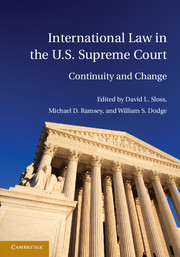Book contents
- Frontmatter
- Contents
- List of Contributors
- Table of Cases
- Acknowledgments
- Introduction
- PART I FROM THE FOUNDING TO THE CIVIL WAR
- PART II FROM THE CIVIL WAR TO THE TURN OF THE CENTURY
- PART III FROM THE TURN OF THE CENTURY TO WORLD WAR II
- PART IV FROM WORLD WAR II TO THE NEW MILLENNIUM
- PART V INTERNATIONAL LAW IN THE U.S. SUPREME COURT IN THE TWENTY-FIRST CENTURY
- V.A TREATIES AFTER 2000
- Main Essay – Medellin and Sanchez-Llamas: Treaties from John Jay to John Roberts
- Response Essay – The Benefits of Avoiding Conflicts between the Constitution and International Law
- Response Essay – Medellin and the Passive Vices
- V.B CUSTOMARY INTERNATIONAL LAW AFTER 2000
- V.C INTERNATIONAL LAW AND CONSTITUTIONAL INTERPRETATION AFTER 2000
- V.D INTERNATIONAL LAW AND STATUTORY INTERPRETATION AFTER 2000
- V.E INTERNATIONAL LAW AND THE WAR ON TERROR
- VI CONCLUSION
- Index
- References
Main Essay – Medellin and Sanchez-Llamas: Treaties from John Jay to John Roberts
Published online by Cambridge University Press: 05 July 2011
- Frontmatter
- Contents
- List of Contributors
- Table of Cases
- Acknowledgments
- Introduction
- PART I FROM THE FOUNDING TO THE CIVIL WAR
- PART II FROM THE CIVIL WAR TO THE TURN OF THE CENTURY
- PART III FROM THE TURN OF THE CENTURY TO WORLD WAR II
- PART IV FROM WORLD WAR II TO THE NEW MILLENNIUM
- PART V INTERNATIONAL LAW IN THE U.S. SUPREME COURT IN THE TWENTY-FIRST CENTURY
- V.A TREATIES AFTER 2000
- Main Essay – Medellin and Sanchez-Llamas: Treaties from John Jay to John Roberts
- Response Essay – The Benefits of Avoiding Conflicts between the Constitution and International Law
- Response Essay – Medellin and the Passive Vices
- V.B CUSTOMARY INTERNATIONAL LAW AFTER 2000
- V.C INTERNATIONAL LAW AND CONSTITUTIONAL INTERPRETATION AFTER 2000
- V.D INTERNATIONAL LAW AND STATUTORY INTERPRETATION AFTER 2000
- V.E INTERNATIONAL LAW AND THE WAR ON TERROR
- VI CONCLUSION
- Index
- References
Summary
Medellin v. Texas and Sanchez-Llamas v. Oregon were the first opportunities for the U.S. Supreme Court to speak in the voice of Chief Justice John Roberts on several of the biggest questions at the connecting points between the U.S. legal order and the rest of the world. In writing for the majority in these cases, the new Chief Justice sent signals to several different audiences about whether and how the United States will fulfill its international obligations. The messages differ markedly from those sent by the divided Court in Hamdan v. Rumsfeld, in which Roberts did not participate. Hamdan was widely (although not universally) perceived as a reaffirmation of the Court's historic role in ensuring that individuals detained under governmental authority have a judicial forum in which their legal claims – including treaty claims – can be determined. The Hamdan majority found reason to believe that Congress intended the United States to comply with the international laws of war embodied in the 1949 Geneva Conventions, and it interpreted those obligations in a way that contributed to the perception of observance rather than abrogation.
Medellin and Sanchez-Llamas presented core issues of treaty jurisprudence in ways Hamdan did not. They marked the conclusion of a decade-long sequence involving the effects in U.S. law of the Vienna Convention on Consular Relations and several other treaties providing for international adjudication of disputes arising under the Vienna Convention.
- Type
- Chapter
- Information
- International Law in the U.S. Supreme Court , pp. 451 - 464Publisher: Cambridge University PressPrint publication year: 2011
References
- 3
- Cited by



